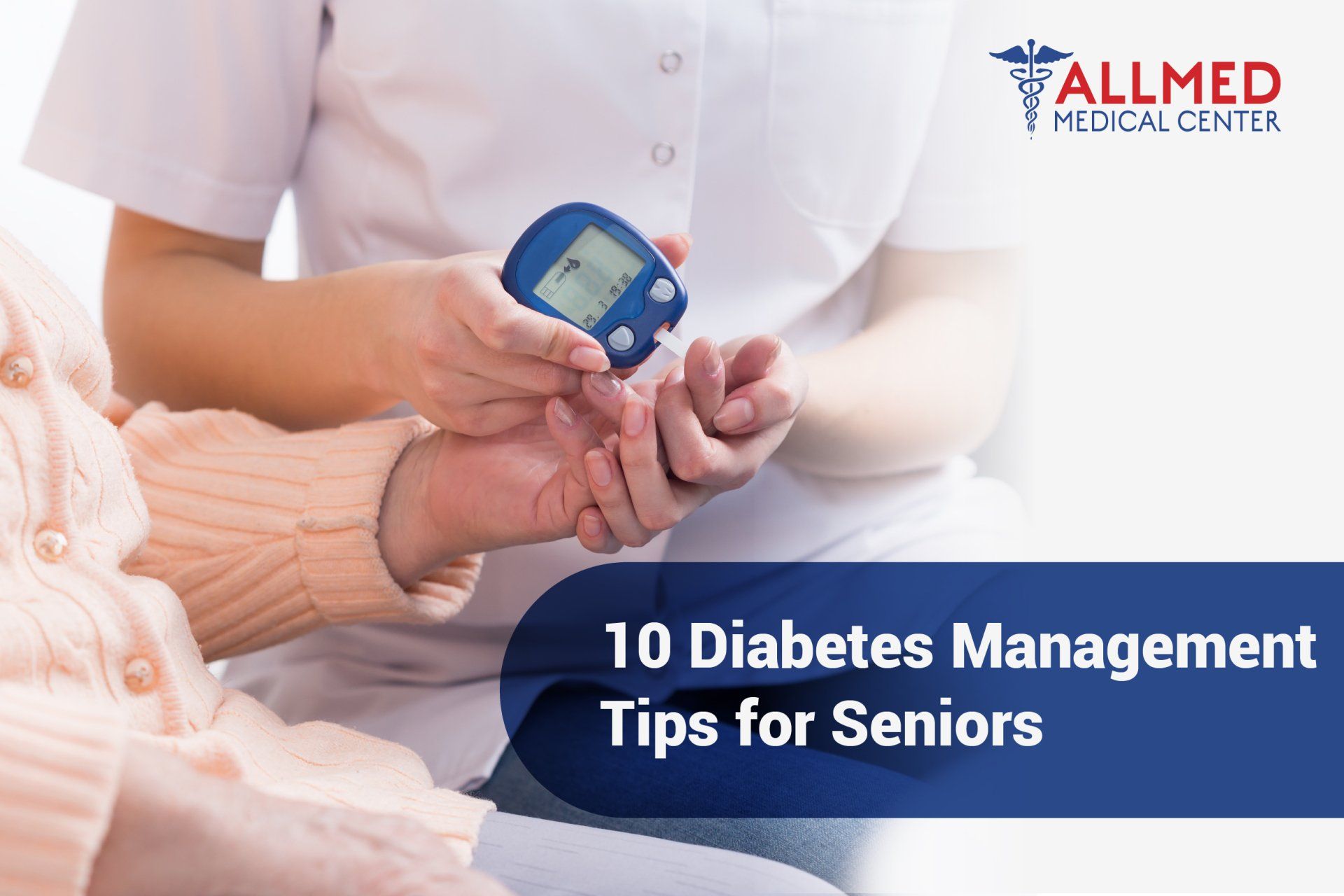
We Proudly Accept Medi-Cal and Medicare
Write your caption hereButton
Now Accepting Walk-ins!
Write your caption here

We Proudly Accept Medi-Cal and Medicare
Write your caption hereButton
Now Accepting Walk-ins!
Write your caption here

Seniors have a higher risk of diabetes complications. The American Diabetes Association reports that one in four people age 65 and older have either Type 1 or Type 2 diabetes compared to those below age 65. On the other hand, diabetes management in the elderly may pose challenges, but the good news is that it is manageable.
However, why are seniors more susceptible to diabetes? Because of aging, a slow metabolism, weight gain, and decreased physical activity, seniors are at a higher risk for developing diabetes. These are at least the most common factors among older people with diabetes. So, early management of diabetes is crucial.
Check these ten diabetes management tips for seniors:
1.Diabetes and Its Symptoms
What is Diabetes? Diabetes affects how the body processes food for energy. Let alone; it also slows down your body's metabolism. If you have diabetes, your body has trouble breaking down sugars from the food you eat. Too much sugar in your blood can affect your health and lifestyle. Like, from how much you exercise to what you eat. Consult a physician if you encounter these diabetes symptoms:
- Fatigue
- Blurry vision
- Feel thirsty
- Lose weight without trying
- Feels very hungry
- Prone to infection
- Urinate (pee) a lot, often at night
- Numbness or tingling in hands or feet
- Fatigue
- Dry skin
- Wounds that heal slowly
In contrast, high blood sugar in the elderly can also put them at risk for diabetes complications. That's why you should take preventative measures and manage diabetes properly by educating yourself on it.
2. Make Sure You Eat a Healthy Diet.
Managing diabetes requires a healthy diet. As a senior, you can do this by:
- Eat fiber and protein-rich foods such as fish, eggs, lean meat.
- Be sure to eat more fruit, vegetables, whole grains, and beans.
- Cut out fruit juice and fresh fruit if you have to avoid sugar. You can try drinking green tea as an alternative.
- Avoid dairy, fried foods, fatty foods, and carbonated drinks.
- Drink more water. Stay hydrated.
3. Take Part in Exercise
For seniors with diabetes, they should exercise for thirty minutes a day, five days a week. According to the
American Diabetes Association, regular exercise helps lower blood sugar and blood pressure. It also offers healthy weight loss. These diabetes exercises for seniors are advisable:
- Walking (outdoors are preferable, walk for at least 5-10 minutes)
- Practicing yoga
- Dancing
- Swimming
- Joining a water aerobics class
- Active stretching
Managing diabetes with diet and exercise is vital to a healthy lifestyle. Before starting a new exercise routine, speak with your doctor first.
4. Manage Your Stress
Your blood sugar levels rise when you're stressed. Anxiety can make it harder for you to manage diabetes. If you feel anxious, you may forget to eat right, exercise, or take your medications. Take deep breaths, practice yoga, or find relaxation hobbies to reduce stress.
5. Lower Alcohol Intake
Most alcohol contains sugar. In addition, some of these alcohols have as many calories as high-fat foods. So a diabetes care tip for seniors: the sooner you stop the habit, the better. Prevention is also better than cure. A deeply entrenched habit can be challenging to break, but you can do a few things about it. Join a support group if you're having trouble quitting. Discuss your options with your physician.
6. Get Vaccinated
A weakened immune system makes seniors more vulnerable to pneumonia and the flu. Those with diabetes are not only more prone to these illnesses but also face lengthy recovery periods. A critical step in diabetes management is to get regular vaccinations recommended by your physician.
7. Monitor Your Blood Sugar Levels
In seniors with hypoglycemia or hyperglycemia, continuous monitoring of their blood sugar is necessary. Your caregiver can help you with this task, or you may do it on your own. It is an important part of diabetes management in the elderly. With your doctor's help, you can learn how to check blood sugar levels and administer insulin.
8. Take Care of Your Feet Every Day
Check your feet daily for cuts, wounds, or signs of infection. If you have trouble seeing your feet, use a mirror or ask a family member to assist you. Call your
healthcare provider if you see a cut or red patch that looks infected. Your doctor may recommend a diabetic foot exam. Always clean your feet, wear lotion to prevent dryness, and wear comfortable shoes to avoid blisters.
9. Don't Miss Your Medication.
Not taking your medication on time can cause your blood sugar levels to become unstable. Using a pill organizer will ensure you don't forget a dose of diabetes medication or run out without notice. If you take other medications, make sure they will not interfere with your diabetes medication. A chart can also help you remember when to take your medicine.
10. Ensure Regular Checkups
Regular medical checkups are essential for older people since they are at higher risk of health issues. Diabetes also increases the chances of heart disease. Learn how to read your cholesterol, blood pressure, and A1c (average blood sugar over three months). Also, see a foot doctor to inspect your feet for conditions such as ulcers and nerve damage.
Now is the ideal time to start a healthy lifestyle choice and reduce your diabetes risk. These
diabetes management tips are great ways to manage your health. Furthermore, a
doctor can help you stay on top of your health issues.
AllMed Medical CentersServing
Greater Sacramento
Allmed Medical Center | All Rights Reserved.










